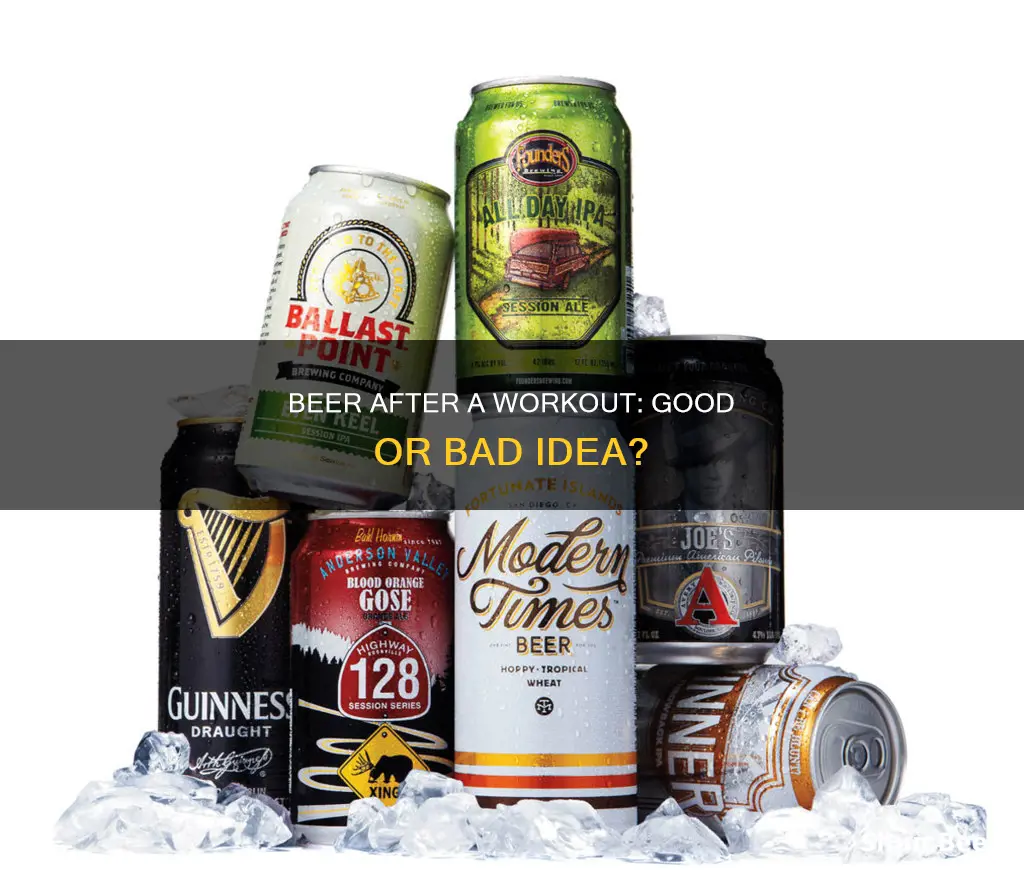
Drinking beer after a workout is a popular way to celebrate and socialise with teammates or friends. However, it is important to be aware of the potential negative effects of alcohol on the body's ability to recover. Alcohol is a diuretic, which means that it increases the amount of urine your body produces, leading to dehydration. This can hinder rehydration and recovery, especially if you don't drink enough water. In addition, alcohol can impair muscle recovery by interfering with protein synthesis, leading to increased muscle soreness and reduced muscle mass gains. It can also disrupt sleep, affect nutritional balance, and cause weight gain. However, having an occasional beer after a workout is generally considered okay for most people, but it may not be the best option for optimal recovery.
| Characteristics | Values |
|---|---|
| Dehydration | Alcohol is a diuretic, increasing the urge to urinate and causing dehydration. |
| Recovery | Alcohol impairs muscle recovery by interfering with protein synthesis and reducing human growth hormone (HGH) production. |
| Sleep | Alcohol can disrupt sleep, which is important for muscle recovery. |
| Nutrition | Alcohol leads to nutritional imbalances, providing empty calories and disrupting normal meal plans. |
| Hormones | Alcohol consumption is linked to higher cortisol and lower testosterone levels, affecting muscle building. |
| Weight | Alcohol consumption can lead to weight gain and increased body fat. |
| Pre-existing conditions | Alcohol can worsen pre-existing conditions, such as seizures, neurological disorders, and heart arrhythmias. |
| Medication interactions | Alcohol can negatively interact with certain medications, such as benzodiazepines. |
| Social aspects | Drinking beer can be a social activity, and some studies suggest that regular exercise can mitigate the negative health impacts of moderate alcohol consumption. |
What You'll Learn

Dehydration
To prevent dehydration, it is crucial to drink enough water before, during, and after your workout. Here are some specific guidelines to ensure proper hydration:
- Drink one cup of water at least four hours before exercising.
- During exercise, drink 4 to 5 ounces (120-150 ml) of water every 10-15 minutes.
- After exercise, drink enough water to double the amount of water your body lost during the workout. Weigh yourself before and after exercising to calculate fluid loss, and aim to drink 16 to 24 ounces of water for every pound lost.
It's important to note that drinking alcoholic beverages, such as beer, after a workout can contribute to dehydration. Both alcohol and exercise deplete the body of fluids, and the diuretic effect of alcohol can lead to increased urination, further exacerbating dehydration. Therefore, it is recommended to choose beverages with lower alcohol content or opt for non-alcoholic alternatives.
In addition to water, your body also needs electrolytes to stay hydrated. Electrolytes such as sodium, magnesium, and calcium chloride are lost through sweating and play a crucial role in balancing water levels and transporting nutrients in your body. Including electrolyte-rich foods or drinks in your post-workout routine can help maintain optimal hydration.
Beer and Cinarizina: A Safe Mix?
You may want to see also

Impaired muscle recovery
Drinking beer after a workout can impair muscle recovery in several ways. Firstly, alcohol consumption can lead to dehydration, as both alcohol and exercise deplete the body of fluids. This can hinder recovery as the body needs to be properly hydrated to refuel, rehydrate, and rebuild muscle efficiently.
Secondly, alcohol can interfere with protein synthesis, which is necessary for muscle repair and growth. This can result in increased muscle soreness and reduced muscle mass gains. Alcohol consumption can also disrupt sleep, further impairing muscle recovery. Sleep is crucial for the body's recovery process, as it is during sleep that the body produces human growth hormone (HGH), which is necessary for muscle repair and growth. Alcohol consumption can reduce the secretion of HGH by up to 70%.
Additionally, alcohol can cause nutritional imbalances, leading to higher cortisol levels and lower testosterone levels. Cortisol is a stress hormone that can inhibit protein synthesis, while testosterone is important for building muscle bulk and strength. Alcohol consumption can also lead to weight gain, as it is calorie-dense and often leads to unhealthy food choices.
Finally, alcohol can worsen pre-existing medical conditions and negatively interact with certain medications. Therefore, it is important to consider the potential impact of alcohol consumption on muscle recovery and overall health. While an occasional post-workout beer may not be detrimental, regular consumption can impair muscle recovery and fitness levels.
Heart Surgery and Beer: What's Safe to Drink?
You may want to see also

Nutritional imbalances
Drinking beer after a workout can lead to nutritional imbalances in the body. Alcohol is a source of empty calories, providing a lot of energy but little nutritional value. It inhibits the body's ability to repair and build muscles, as well as interfering with protein synthesis. This results in increased muscle soreness and reduced muscle mass gains.
When individuals refuel with alcohol instead of carbohydrates, protein, and electrolytes, they deprive their bodies of the energy sources required for optimal performance and recovery. While beer contains carbohydrates, they are metabolised and stored as fat, rather than being used for refuelling or rebuilding muscle. This can negatively impact lean muscle gains.
Additionally, alcohol consumption can suppress the production of protein needed to repair muscle damage after exercise. It also decreases testosterone and growth hormone levels, which are crucial for muscle growth and recovery. As a result, drinking beer after a workout can hinder the body's ability to repair and rebuild muscles efficiently, leading to nutritional imbalances.
To maintain nutritional balance, it is recommended to refuel with carbohydrates and protein from non-alcoholic sources after a workout. This will ensure the body receives the necessary nutrients for optimal recovery and performance.
Shanghai's Public Drinking Laws: Beer Allowed?
You may want to see also

Sleep disruption
Drinking beer after a workout can disrupt sleep, which is an important part of the workout recovery process. Studies have shown that alcohol can negatively impact sleep quality, even if it may help you fall asleep initially.
Alcohol affects the sleep cycle by altering the amount of time spent in the different stages of sleep. It increases slow-wave sleep (SWS) or deep sleep in the first half of the night and disrupts sleep in the second half, leading to more wakefulness and fragmented sleep. This disruption can result in frequent wakings and low-quality sleep overall.
Additionally, alcohol suppresses REM sleep, which is necessary for muscle repair and growth. One study found that alcohol can reduce the secretion of human growth hormone (HGH), which is produced during sleep, by up to 70%.
The negative impact of alcohol on sleep can be both acute, with immediate effects, and chronic, affecting heavy drinkers long-term. It can also interfere with circadian rhythms, which are biological patterns that operate on a 24-hour clock, by decreasing the body's sensitivity to cues like daylight and darkness.
Drinking close to bedtime can further worsen sleep quality. It is recommended to avoid alcohol at least three hours before bed to minimise its disruptive effects.
Overall, the combination of exercise and alcohol can lead to sleep disruption, affecting recovery and performance.
Drinking Beer at Anfield: What's the Deal?
You may want to see also

Weight gain
Alcoholic beverages are calorie-dense, with even light beers containing around 100 calories. If you are working out to lose weight, drinking beer after exercising will not help you achieve your goal. Alcohol is a source of 'empty calories', providing a lot of energy but little nutritional value. This means that the calories you consume from alcohol are more likely to be turned into fat.
Alcohol also lowers your inhibitions, which may cause you to crave unhealthy foods for your post-workout meal, further setting you off your plan. One study showed that athletes who drink alcohol are twice as likely to get injured as those who don't, possibly because alcohol slows down muscle recovery times by decreasing testosterone and growth hormone levels.
If you are watching your weight, it is recommended that you opt for a low-calorie, low-carb beer.
Beer and Bipolar Disorder: What's the Connection?
You may want to see also







